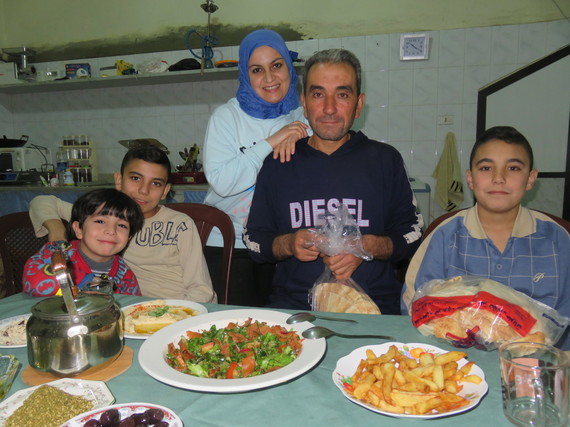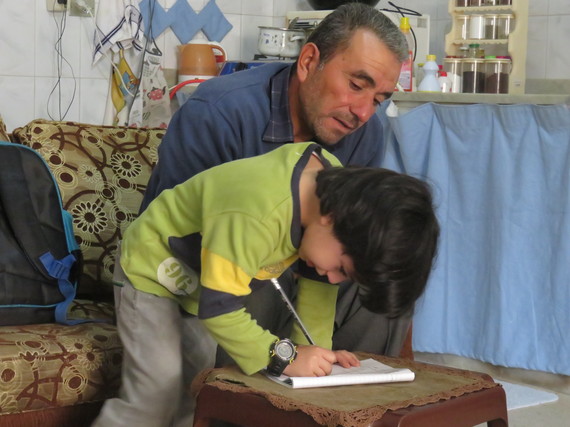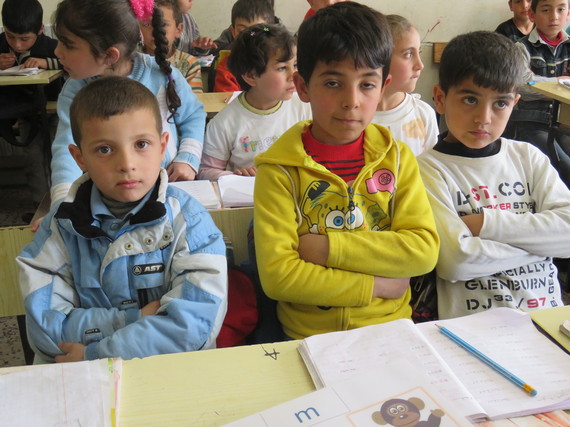
By Pam Bailey, founder, We Are Not Numbers
I spent my Thanksgiving in Bire, a small town in northern Lebanon about an hour from Tripoli and within sight of the Syrian border, across from the ancient city of Homs. It is a small town, of maybe 5,000 Lebanese, but now more than twice its original size as it swells with Syrians who have fled their brutal civil war.
I am served by my "adopted" Syrian family what seems to me a fitting feast for Thanksgiving--homemade local dishes made all the more delicious due to the family affair it becomes (Mohammed, 12, dreams of being a chef). Chicken kabob, fatoush, capsa, hummus, tea with cinnamon. Over our meal, Dalia--who fled to Lebanon two-and-a-half years ago with her husband and three sons--asks if it is true what she heard on the news, that the United States may refuse to accept any more Syrian refugees.
I almost choke. Right before flying to Beirut, I had attended the hearing of the Judiciary Committee of the House of Representatives, at which several Republicans boldly, without any seeming shame, proposed rejecting Syrians, or at least those who are Muslims. "Can you name one suicide terrorist who was not a Muslim?" asked Rep. Steve King of Iowa of the State Department spokesperson.
I hesitate, trying to think of the least-offensive way to describe the full House vote a couple of days later, which demanded a suspension in acceptance of Syrian and Iraqi refugees until national security agencies can certify they don't pose a security risk. (That's an impossible ask. How can one prove a negative?) The bill now, yet to make its way to the Senate, is fueled by unsubstantiated reports that "jihadist" cells are hiding among the refugees in Lebanon.
"The Republicans and the few Democrats who support them say they want a 'pause' in the review of Syrian refugees for resettlement," I try to explain. "They want the president to guarantee without a doubt you're not terrorists."
I look around the restaurant-turned-refugee-home, a cavernous building with furniture hand made by Dalia's husband, Abdullah; curtains bought at a second-hand shop by Dalia; and a still-scraggly garden where the family is trying to grow their own potatoes, radishes and mint. Their entire lives have been on "pause" for nearly five years, when civil war broke out in Syria. Fatigue from working long hours as a bus driver and, whenever he can, as a construction laborer is clear around Abdallah's eyes. What can I do but apologize for my country?
When Syria's civil war intensified, Dalia and Abdullah were forced to abandon their comfortable life--her job as an English teacher, his thriving chicken farm, the lush garden where Hadi (now 13), Mohammed and Taim (7) loved to play. Abdullah had retired earlier from a career as a first assistant in the Syrian army, but as the fighting escalated, he was summoned back. Fleeing to Lebanon seemed the only way to avoid being forced to kill. As it turned out, the family was exceedingly fortunate in being able to escape; not too long after, the Syrian army razed most of their little hamlet outside Homs--gutting their home, killing five of Abdullah's friends who also had gone AWOL from the army and imprisoning his 30-year-old nephew, who was forced to give himself up to save his wife and five-year-old daughter.
"I cry every time I watch the video," Dalia tells me, her eyes welling up. The video of her once beautiful home, now a burned shell, was shot by another of Abdullah's nephews, who remains in the Syrian army to avoid his cousin's unknown fate. "We just talked to him by phone two weeks ago, and he was crying. He doesn't want to be there, to be part of what is going on." Even if the young man could elude the army alive, Lebanon has stopped accepting new Syrian refugees, and entering illegally costs an excessive amount few can muster.
At first, Dalia, Abdullah and their boys crowded into the two-bedroom-one-bath apartment rented by her parents in Tripoli's Baddawi camp, occupied primarily by Palestinians. But Dalia and Abdullah describe themselves as quiet "village people," and they soon made their way to Bire looking for a more a rural respite. The first shelter they found was an even more cramped, dank, two-room flat where I first met them on a previous trip in April. The crumbling, exposed-cement rooms rented for $250 a month, a sum that quickly burned through the funds they had managed to bring with them.
Their situation improved when Dalia was able to get a job teaching English in a private school run by a sympathetic Lebanese man whose brother, the original owner, was assassinated for his support of the early opposition to Syria's President Bashar Al-Assad. The school opened its doors for an afternoon shift of free education for Syrian refugees, and Dalia had started volunteering almost immediately. Her effectiveness as a teacher soon attracted attention and when one of the English teachers for the Lebanese classes suddenly quit, the headmaster gave her a chance. (Since Syrian refugees officially are prohibited from working, their jobs must be "under the table"--putting them at risk of exploitation, like those who illegally entered other countries worldwide.)
On this trip, I found them in their converted restaurant. Abdullah has managed to find semi-regular work driving a bus for the same Lebanese school, to supplement his construction day labor. With their combined pay, they can cover rent and food. However, they are in debt to friends and relatives for more than $1,000, a small fortune for the family. Medical care, like the MRI Dalia needed recently for a suspected disc problem (which I covered), and luxuries like toys and books for the boys are out of the question. Fear is never far from their consciousness. When Dalia took a "service" (a shared car that is a very cheap form of transportation) to pick me up at the bus station in Tripoli, she left Abdullah at home. Males are routinely stopped by the military, and Abdullah's Lebanese residency permit has long since expired, and they can't afford to renew it - both due to the fee and the fact that to do so, they both would have to pledge not to work. This is no way to live.
To date, the United States has accepted a mere 2,000 or so out of nearly four million Syrian refugees. Screening for "security risks" takes 18-24 months, compared to Europe's average of four. I cannot help but wonder, when senators, representatives and presidents choose to send drones, military advisors or any other type of militarized intervention into another country (which I do not support), should they not acknowledge up front that there will be refugees--along with a responsibility to care for their share?
In my travels around Lebanon, I have seen refugees struggling with widely varying conditions. Some fall into depression, with their already-degrading surroundings falling into further disrepair as they sink into a metaphorical black hole. Others, like Dalia and Abdullah, manage to make whatever they can of wherever they are. At night before I fall asleep, I find Dalia down on her knees, sweeping up crumbs from their cold floors, after helping her children study for an exam the next day. Is this not a strength of character we should welcome into our country, while adding as little pain as possible to lives already stressed beyond most people's imaginations?
"I think about my children's future day and night," Dalia tells me. "In Syria, Hadi dreamt about being a doctor, Mohammed a chef and Taim a pilot. I have no idea when or if we can ever return home, and how can they achieve their dreams here? Every day, their lives are slipping away."



